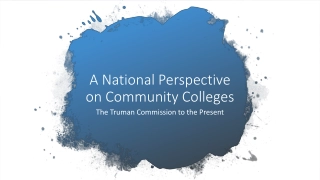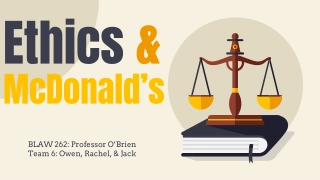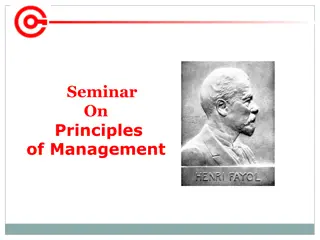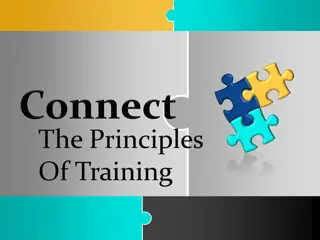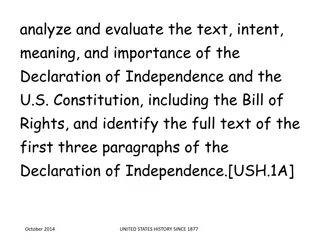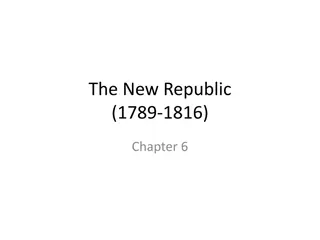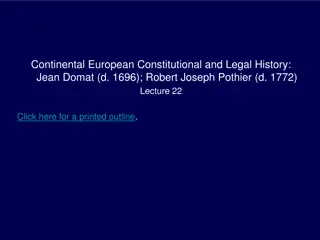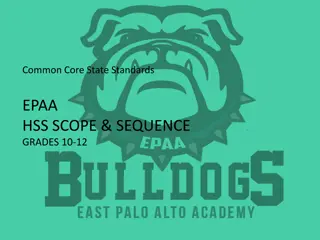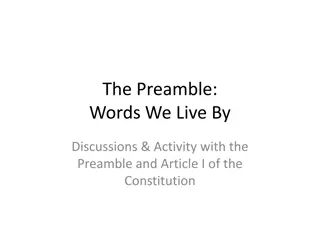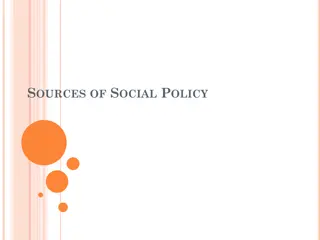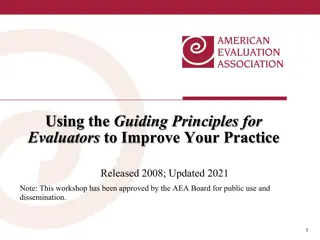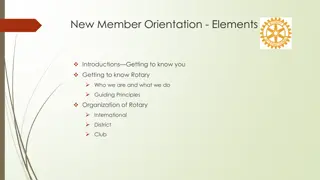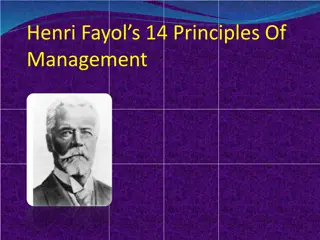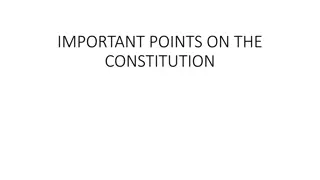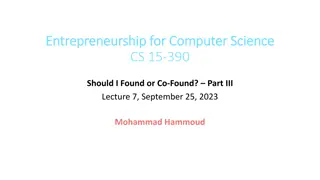A National Perspective on Community Colleges
Historical overview of community colleges in the United States, from the passage of the Morril Act in 1862 to the present day. It explores the founding legislation, the impact on higher education, and the goals and challenges faced by community colleges. The presentation includes images and importan
0 views • 25 slides
Ethics & McDonald’s
Discover the ethical journey of McDonald's, from its founding to today, exploring ethics programs and practices within the iconic brand.
0 views • 28 slides
Motivating Hope: The Adventures of Brian Matthew Markle in Ottawa
Locate the inspirational story of Pastor Brian Markle, also known as Brian Matthew Markle, as he serves and perseveres while navigating Ottawa's complex social fabric. From his membership in Alcoholics Anonymous to his innovative efforts in founding a state-of-the-art treatment facility, Brian's nar
2 views • 1 slides
World Health Day Celebrations and Definitions of Health
The World Health Day, observed on April 7 each year since 1950, marks the founding of WHO and promotes global health awareness. It emphasizes the importance of access to quality healthcare. The theme for 2023 focuses on recognizing the contributions of nurses and midwives. Definitions of health from
10 views • 19 slides
Explore the Legacy of Iowa Girls State: History, Founders, and Milestones
Delve into the rich history of Iowa Girls State, a program initiated in 1946 by visionary women to empower high school girls in civic responsibility. Learn about the founding members, key highlights over the years, and the significant milestones that have shaped this esteemed program, including cele
0 views • 49 slides
Alliance d'EHPAD - Providing Holistic Care Through Spiritual Support
Alliance d'EHPAD focuses on providing comprehensive care for individuals in residential care facilities by offering spiritual accompaniment. Founded on Christian principles, the organization values human dignity, solidarity, and promoting life until the end. Learn about their mission, founding membe
2 views • 20 slides
Principles of the Ghana Civil Service Code of Conduct
The Code of Conduct for the Ghana Civil Service, outlined by Elizabeth Obeng-Yeboah, emphasizes principles such as abiding by the constitution and laws with dignity, integrity, and professionalism. It sets standards for conduct, avoiding conflicts of interest, maintaining political neutrality, and u
1 views • 34 slides
Academic Freedom and Shared Governance in Higher Education
Academic Freedom and Shared Governance are foundational principles advocated by the American Association of University Professors (AAUP) to ensure educators have the freedom to explore, research, teach, and discuss without censorship. These principles empower educators to enhance student learning an
0 views • 9 slides
Essential Principles of Management Discussed in Seminar
Explore the foundational principles of management discussed in a seminar on principles of management. Delve into topics such as division of work, authority, discipline, unity of command, and unity of direction as outlined by Henri Fayol. Gain insights into the importance of these principles for effe
0 views • 22 slides
Explore Boy Scouts: History, Origins, and Values
Uncover the fascinating history of the Boy Scouts, from its founding by Lord Baden-Powell in 1910 in England to its spread across the globe. Discover key details such as the release of the Boy Scout program in America, the different Scout programs available, the Scout Law, Oath, Motto, and essential
0 views • 38 slides
International Law of War: Nuremberg Principles and Accountability
The Nuremberg Principles, derived from the trials of Nazi officials for war crimes, establish accountability in international law. These principles hold individuals responsible for committing acts considered crimes under international law, regardless of their position or orders received. The assumpt
2 views • 22 slides
Promoting Ethical Principles in Social Science Research
Explore the challenges and strategies for translating and applying ethical principles, especially in emergency contexts. Learn key questions in social science research and how to ensure information contributes to community actions. Understand the importance of considering ethical principles in all w
0 views • 21 slides
America's Founding Ideals: A Historical Perspective on Religion and Governance
The history of America's founding reflects a diverse interplay between Puritanism and Deism, influencing the country's governance and religious landscape. Rooted in principles of faith and secularism, the nation's journey sheds light on the evolution of beliefs and compromises in shaping its constit
0 views • 68 slides
Study Guide for Principles of Management Course at Africa Research University (ARU)
Welcome to Africa Research University (ARU)! This study guide is designed to help you navigate through the Principles of Management course (Course Code: PRM4) at ARU. It provides an introduction to the course content, emphasizing the importance of developing management skills to effectively lead and
1 views • 40 slides
Key Principles of Insurance Explained with Visuals
Understanding the principles of insurance is crucial for both insurance seekers and companies. The principles include Utmost Good Faith, Insurable Interest, Indemnity, Contribution, and Subrogation. These principles ensure transparency, fairness, and protection for policyholders. Visual representati
0 views • 6 slides
Principles of Training: Overload, Specificity, and Progression
Principles of training encompass overload, specificity, and progression. Overload requires doing more than usual, specificity involves tailored activities, and progression ensures gradual advancement. These principles are vital for improving fitness levels safely and effectively, emphasizing the nee
8 views • 17 slides
Understanding U.S. History: Founding Documents, Founding Fathers, and Major Eras
Explore the significance of the Declaration of Independence, U.S. Constitution, and Bill of Rights, along with the contributions of notable Founding Fathers. Delve into applying founding principles to historical events and identifying major characteristics and eras in U.S. history, from 1877 to the
0 views • 115 slides
Horacio Pagini: Argentine-Italian Businessman & Automotive Engineer
Horacio Pagini, an Argentine-Italian businessman and engineer in the automotive industry, is renowned for founding Pagani Automobili S.p.A. With a background working at Renault and Lamborghini, Pagani's journey from humble beginnings in rural Argentina to founding his own successful automotive compa
0 views • 6 slides
Insights into the New Republic (1789-1816): Government, Politics, and Founding of Washington D.C.
Discover the establishment of the New Republic from 1789 to 1816, exploring aspects such as government structures, party politics, interpretation of the Constitution, pivotal figures like George Washington and Alexander Hamilton, and the founding of Washington D.C., with a glimpse into historical ev
0 views • 43 slides
Benjamin Franklin - A Founding Father and Polymath
Benjamin Franklin, a renowned figure in British and American history, was a political leader, writer, printer, and scientist. He played a crucial role in drafting the Declaration of Independence and the American Constitution. Franklin's inventions as a scientist, such as the lightning rod and bifoca
1 views • 13 slides
The Outstanding Legal Minds: Jean Domat and Robert Joseph Pothier
Explore the lives and works of Jean Domat and Robert Joseph Pothier, prominent French jurists of the late 17th and mid-18th centuries. Domat focused on founding law on ethical principles, while Pothier's significant contributions include the Pandectae Justinianae. Learn about their radical simplific
0 views • 33 slides
Thomas Jefferson - Founding Father of American History
Thomas Jefferson, a significant figure in British and American history, was the third US President and a Founding Father who played a key role in writing the Declaration of Independence. He supported the Louisiana Purchase, established the University of Virginia, and helped design Washington DC. Jef
0 views • 9 slides
Myth of Romulus and Remus: From Founding Rome to the Rape of the Sabine Women
Romulus and Remus, twin sons of the god Mars, founded Rome after being raised by a she-wolf. Their story includes betrayals, raids, and the infamous Rape of the Sabine Women to secure wives for their growing population. The tale intertwines mythology and history in the founding of the Roman civiliza
0 views • 6 slides
American History Curriculum for Grade 11 - Semester 1
This American history curriculum for Grade 11 Semester 1 covers key topics such as the Declaration of Independence, American Revolution, industrialization, urbanization, immigration, imperialism, and the United States' emergence as a world power. Students will examine diverse aspects of American his
0 views • 11 slides
Effective Partnership and Mutual Accountability in Nutrition Clusters
The content discusses the minimum commitments needed for participation in Nutrition Clusters, explains the Principles of Partnership, and explores how these principles can enhance coordination and accountability to affected populations. It emphasizes partner commitments, such as leadership, mainstre
0 views • 7 slides
Exploring the Preamble and Article I of the US Constitution
Delve into the significance of the Preamble, its goals, and the core principles it establishes. Dive into discussions about popular sovereignty, the founding fathers, and the evolving nature of the Constitution as outlined in Article I. Engage in activities to understand the key concepts underpinnin
0 views • 7 slides
Overview of Fundamental Principles of Space Law and Outer Space Treaties
The content discusses the fundamental principles of space law highlighted at the United Nations Space Law Conference 2020, focusing on key treaties such as the Outer Space Treaty of 1967 and associated rights, duties, and obligations of states in space exploration and use, including non-appropriatio
0 views • 16 slides
Overview of Directive Principles of State Policy in Indian Constitution
Directive Principles of State Policy (DPSP) in the Indian Constitution encompass social, economic, and political programs aimed at realizing ideals of justice, liberty, equality, and fraternity. They are non-justiciable but guide the state in legislative matters. Classified into Socialistic, Gandhia
0 views • 24 slides
Evolution of Political Ideas and Influences on American Founding
In the history of politics, major ideas like laws of nature, unalienable rights, divine right of kings, social contract theory, and rights of resistance have influenced the American founding. Various traditions such as Judeo-Christian, English common law, Enlightenment, and republicanism played a si
0 views • 68 slides
Understanding FAIR Principles in Biomedical Research
The FAIR principles - Findable, Accessible, Interoperable, and Reusable - provide a framework for ensuring scientific data in biomedical research is managed and shared effectively. This informative session delves into the theory and practice of FAIR principles, emphasizing the importance of data qua
0 views • 28 slides
The FAIR Principles for Data Management and Stewardship
Embrace the FAIR principles - Findable, Accessible, Interoperable, Re-usable - for effective scientific data management and stewardship. Learn how annotations enhance data FAIRness and the key attributes of each principle. Dive into the high-level guiding principles that ensure data is globally uniq
0 views • 25 slides
Germany: Founding Member of THLG 1987 - Riedl Group Overview
Germany, a founding member of the THLG since 1987, is represented by the Riedl Group, specifically Rolf Riedl GmbH. The company provides project forwarding and logistics services in various sectors including Oil & Gas, Power Energy, Nuclear, Renewables, and more. They specialize in project managemen
0 views • 5 slides
Understanding the Guiding Principles for Evaluators
This content provides insights into the Guiding Principles for Evaluators, including their history, assumptions, and key principles such as Systematic Inquiry and Competence. The workshop aims to increase knowledge about ethical evaluation practices and stimulate discussions within the evaluation co
0 views • 22 slides
Guiding Principles for GETSI/INTEGRATE Webinar – Materials Development and Goals
The webinar presented by David Steer from the University of Akron focuses on guiding principles for material development in the context of GETSI/INTEGRATE modules. It outlines goals for the session, including discussing components of the guiding principles, examples of meeting those principles, and
0 views • 13 slides
Rotary International: A Journey of Service and Fellowship
Discover the essence of Rotary International through its rich history, mission, guiding principles, and the opportunity it provides for individuals to make a positive impact globally. Explore the founding of the organization by Paul Harris, the core values it upholds, and the vision for creating a w
0 views • 37 slides
Understanding Henri Fayol's 14 Principles of Management
Henri Fayol, the Father of Modern Management, introduced 14 Principles of Management in 1916, outlining essential guidelines for effective management. These principles cover areas such as division of work, authority and responsibility, discipline, unity of command, and unity of direction. By followi
0 views • 19 slides
Principles of Management: Understanding Henri Fayol's 14 Key Principles
Explore the foundational principles of management through the lens of Henri Fayol's 14 key principles, which offer valuable insights into managerial decision-making and organizational interactions. Delve into the history of Henri Fayol, his contributions to management theory, the concept of authorit
0 views • 14 slides
Founding Principles and Debates in the Creation of the Constitution
The Constitution's formation was influenced by key principles such as Natural Rights and Popular Sovereignty, advocated by figures like John Locke and James Madison. The debates at the Constitutional Convention centered on issues like representation of states, separation of powers, and checks and ba
0 views • 19 slides
Deciding Between Solo or Co-Founding in Entrepreneurship for Computer Science
Today's lecture in the Entrepreneurship for Computer Science course explores the decision of starting a company solo or co-founding. It emphasizes the importance of finding a co-founder who shares your values and vision while managing partnership tensions effectively. The lecture also covers roles a
0 views • 31 slides
Legal Principles of Insurance
The legal principles of insurance include indemnity, insurable interest, subrogation, and utmost good faith. These principles ensure fair compensation, financial risk protection, and honesty in insurance contracts. Understanding these principles is crucial for both insurers and policyholders to navi
0 views • 18 slides
